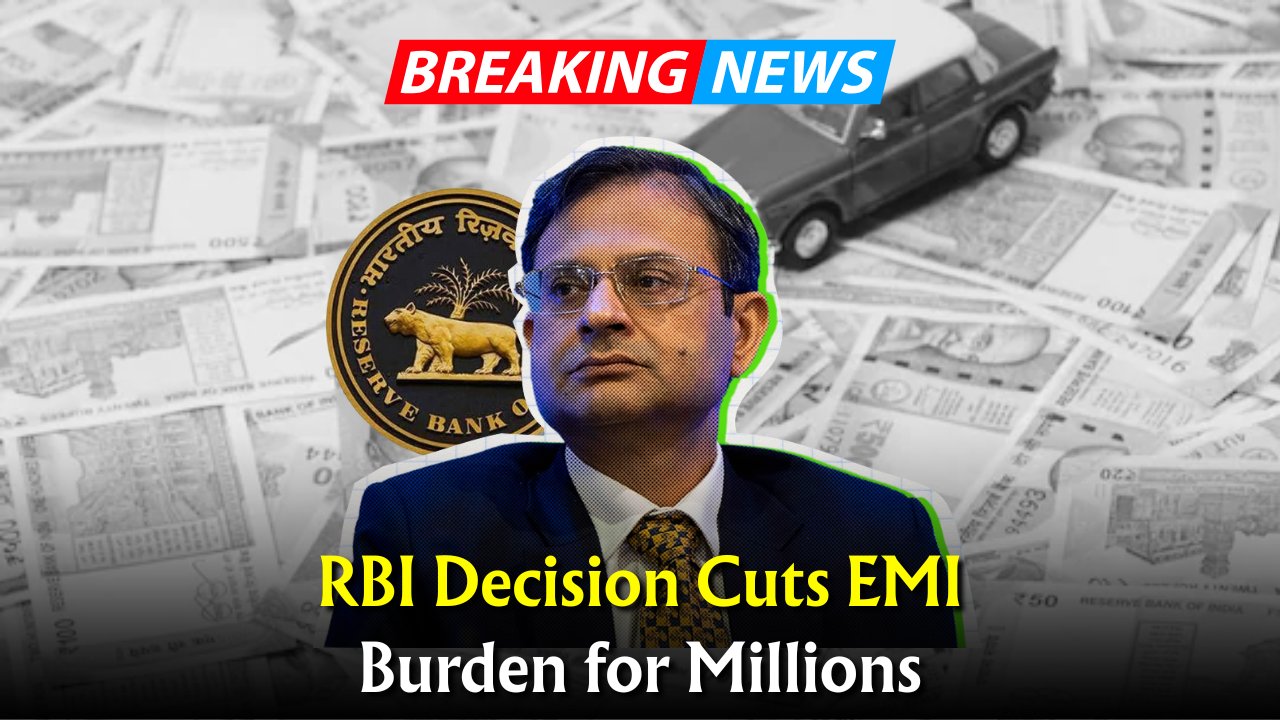Repo Rate : In a major relief for borrowers across India, the Reserve Bank of India (RBI) has announced a significant cut in the repo rate, making home loans, car loans, and other EMIs cheaper starting this month. This move is aimed at boosting consumption, increasing liquidity, and giving the economy a fresh push amid global uncertainties and domestic challenges.
The central bank’s decision comes after assessing inflation trends, global economic pressures, and the need to stimulate demand. Millions of loan holders and potential borrowers are expected to benefit from reduced interest burdens in the coming months.
What is the Repo Rate Update and Why It Matters
- The repo rate is the interest rate at which the RBI lends money to commercial banks.
- A reduction in repo rate typically leads to a fall in interest rates for borrowers.
- Lower repo rates make loans cheaper, thereby encouraging spending and investment.
Repo rate changes influence not just banks but also ripple through housing finance, vehicle loans, personal loans, and business credit.
Latest Repo Rate Cut – Key Details
| Aspect | Previous Rate (%) | New Rate (%) | Change (bps) |
|---|---|---|---|
| RBI Repo Rate | 6.50 | 6.25 | -25 |
| Reverse Repo Rate | 3.35 | 3.10 | -25 |
| Bank Lending Rate Impact | 9.00 (avg) | 8.75 (avg) | -25 |
| Home Loan Interest (avg) | 9.20 | 8.95 | -25 |
| Car Loan Interest (avg) | 9.50 | 9.25 | -25 |
| Personal Loan Interest (avg) | 11.50 | 11.25 | -25 |
| Loan EMI Impact | Minor to Moderate |
This latest cut of 25 basis points (bps) is expected to be passed on quickly by banks and NBFCs due to existing repo-linked lending systems.
Impact on Home Loan Borrowers
Home loan borrowers are likely to see immediate benefits:
- Reduced EMIs for ongoing loans with floating interest rates.
- Lower interest outgo over loan tenure for new borrowers.
- Enhanced loan eligibility due to lower interest burden.
EMI Comparison Before and After the Cut
| Loan Amount | Tenure (Years) | Old EMI @ 9.2% | New EMI @ 8.95% | Monthly Saving | Total Saving (20 yrs) |
|---|---|---|---|---|---|
| ₹20 Lakh | 20 | ₹18,300 | ₹17,990 | ₹310 | ₹74,400 |
| ₹40 Lakh | 20 | ₹36,600 | ₹35,980 | ₹620 | ₹1,48,800 |
| ₹50 Lakh | 25 | ₹43,600 | ₹42,930 | ₹670 | ₹2,01,000 |
Note: Values are approximate and vary by lender.
Effect on Car and Personal Loans
While the primary impact is seen in home loans due to higher values and longer tenures, car loans and personal loans also see noticeable effects:
- Car Loans: Cheaper financing could boost automobile sales, especially in the mid and entry-level segment.
- Personal Loans: Reduced rates will bring down interest-heavy EMIs, encouraging consumer spending.
| Loan Type | Avg Interest Rate Before | After Repo Cut | Approx Monthly EMI Change (₹5L for 5 yrs) |
|---|---|---|---|
| Car Loan | 9.50% | 9.25% | ₹110 less |
| Personal Loan | 11.50% | 11.25% | ₹140 less |
How Banks Are Responding
Most major banks are expected to revise their lending rates in line with the RBI’s repo cut. Leading institutions have already hinted at lower MCLR and RLLR rates.
Banks Likely to Cut Lending Rates Soon:
- State Bank of India (SBI)
- HDFC Bank
- ICICI Bank
- Bank of Baroda
- Axis Bank
- Punjab National Bank
Borrowers with repo-linked loans will benefit the fastest, as these products are directly tied to the repo rate.
What Borrowers Should Do Now
Here’s how existing and new borrowers can make the most of the rate cut:
- Existing Borrowers: Check with your bank if your EMI will reduce automatically; if not, consider refinancing your loan.
- New Borrowers: This is a good time to apply for home or car loans.
- Consider Balance Transfer: Shift to a lender offering lower repo-linked rates.
Tips for Loan Optimization
- Opt for shorter tenure if possible to save on total interest.
- Keep an eye on processing fees when switching loans.
- Use an EMI calculator to assess savings before taking action.
The RBI’s decision to cut the repo rate is a welcome move for individuals and businesses alike. With the cost of borrowing set to fall, consumers can look forward to cheaper EMIs, higher affordability, and more liquidity in their hands. The coming months are expected to see a surge in home, auto, and personal loan demand as borrowers rush to capitalize on the reduced rates.
